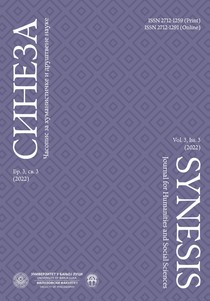Теоријски концепт културе сјећања-заборава у настави књижевности (у Републици Српској)
Theory of culture of remembrance in literature teaching practice (in Republic of Srpska)
Author(s): Nina Z. GovedarSubject(s): School education, Sociology of Education, Politics of History/Memory, Pedagogy, Sociology of Literature
Published by: Filozofski fakultet, Univerzitet u Banjoj Luci
Keywords: culture of memory and remembrance; memory; teaching; literature; methodology;
Summary/Abstract: Collective memory is conditioned by social, historical, ideological, political, and other circumstances, and how information and facts from the domain of collective memory are evoked and contextualized is collective memory. Contextualization is done systematically, programming what should remain a part of the collective memory and what goes into oblivion. This way, information from the memory domain is filtered and adapted to the prevailing social circumstances and needs. Knowledge and contextualized information transmitted through the concept of collective memory is socially and culturally shaped into a system of culture of memory—selected memories based on national, ideological, political, social, and other narratives are built. Our research is focused on the analysis of possibilities offered by current curricula for primary and secondary schools in the field of cultivating the culture of memory and remembrance and the formation of a theoretical framework that would be the starting point for achieving teaching goals related to cultivating the culture of memory in teaching practice. It is important that teachers, when preparing for each of the lessons in which the teaching unit can be connected with the teaching concept of fostering the culture of memory, think about the appropriate context in which they can present the historical facts so that they are understandable and close to the students of the given age. It is necessary to keep in mind that the concept of the culture of memory and remembrance teaching should not be linked only to suffering and victims. Achieving educational goals should be strictly coordinated with the age of the students, their reading and life experience, and with the intention to develop positive emotions through a conversation within this teaching topic: feelings of love, belonging, pride, and attachment. By the recommendations from the curriculum and within the scope of the possibility to choose additional texts on which the educational outcomes outlined in the program will be achieved, it is necessary to talk to students about the literary works of native writers and the historical, cultural, and ethnological peculiarities of the region where the school is located. Regardless of the need to further didactically determine the conclusions reached in the interpretations of such literary texts, indeed, superficial didacticism (by insisting on the concepts of instruction, message, or idea) can only reduce the breadth of interpretation of a literary text and lead to us to a situation where, instead of enriching the experience of the students regarding the literary text, we reduce it to maxims and ideological conclusions. Just as it is necessary for the stages of introducing students to the context of a literary work to motivate them to read and interpret, synthesize impressions, and understand a literary text, it is necessary to establish correlations with the contents of other subjects (especially History, Geography, and Arts).
Journal: Sineza
- Issue Year: 3/2022
- Issue No: 3
- Page Range: 59-73
- Page Count: 15
- Language: Serbian

